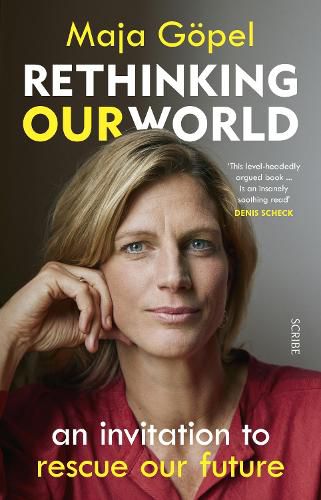Readings Newsletter
Become a Readings Member to make your shopping experience even easier.
Sign in or sign up for free!
You’re not far away from qualifying for FREE standard shipping within Australia
You’ve qualified for FREE standard shipping within Australia
The cart is loading…






As this major German bestseller reports, our world is at a tipping point, and we feel it every day. On the one hand, we have never been so well off; on the other hand, we find destruction and crisis everywhere we look. Whether throughout the environment or within society, our systems are under stress.
In this book, Maja Göpel, co-founder of the Scientists for Future initiative and a former secretary-general of the German Advisory Council on Global Change, explains that this new reality didn’t just happen overnight, but rather is a result of our continuous actions — actions propelled by principles and beliefs, which have shaped us as a society over generations. We do not solely face an environmental crisis, but also a social one. It’s time to question our principles, set new goals, and re-evaluate our priorities. It’s time to rethink our world, because if we want to keep our livelihoods, we need to find a way of living without draining our planet any further. We need a fair distribution of wealth and a way to reconcile the social with the ecological.
Critical, yet full of encouragement, Maja Göpel chooses surprising and enlightening examples to illustrate how we can leave behind our familiar ways of living to achieve a better future. With that, she invites us to look at this future we are shaping every day in a new and completely different way.
$9.00 standard shipping within Australia
FREE standard shipping within Australia for orders over $100.00
Express & International shipping calculated at checkout
As this major German bestseller reports, our world is at a tipping point, and we feel it every day. On the one hand, we have never been so well off; on the other hand, we find destruction and crisis everywhere we look. Whether throughout the environment or within society, our systems are under stress.
In this book, Maja Göpel, co-founder of the Scientists for Future initiative and a former secretary-general of the German Advisory Council on Global Change, explains that this new reality didn’t just happen overnight, but rather is a result of our continuous actions — actions propelled by principles and beliefs, which have shaped us as a society over generations. We do not solely face an environmental crisis, but also a social one. It’s time to question our principles, set new goals, and re-evaluate our priorities. It’s time to rethink our world, because if we want to keep our livelihoods, we need to find a way of living without draining our planet any further. We need a fair distribution of wealth and a way to reconcile the social with the ecological.
Critical, yet full of encouragement, Maja Göpel chooses surprising and enlightening examples to illustrate how we can leave behind our familiar ways of living to achieve a better future. With that, she invites us to look at this future we are shaping every day in a new and completely different way.
Humankind is in the midst of environmental and social crisis. Business as usual is not an option. Dr Maya Göpel is a political economist who is motivated to impel her readers to question the very rules and concepts upon which economic systems are founded; concepts which many of our institutions take for granted and rules which have become systemic.
Göpel rigorously analyses traditional theories of economic growth, privatisation, consumption, and the infallibility of ‘the market’. Endless expansion and extraction by Western industrialised nations has led to this moment in time and Göpel warns that we must rethink these systems of our world in order to proactively move towards a more regenerative cycle. Göpel isn’t saying anything new here, rather she is skilfully bringing together ideas from psychology, economics, philosophy, science and history to create a highly readable interdisciplinary summary of the crisis at hand.
She does not shy away from exposing the inequalities that are created and perpetuated by the powers that be and those of us living in comfortable privilege. Her chapter on ‘fairness’ as the key to a more sustainable economic system is particularly engaging and will hopefully sufficiently enrage her readers to take action. In the final chapter, Göpel cautions the reader against what she calls the ‘Mean Monday’ phenomenon. This, she describes, is that feeling that occurs after you have read a book such as this one and been convinced to take action but then you put the book down and return to the world and everything is the same as it was before.
Göpel reminds us that awareness is one of the first steps, and the knowledge and belief that business as usual is not an option can be a powerful place to start.
Find new ways to look at important local and world issues with these well-researched and thought-provoking books.